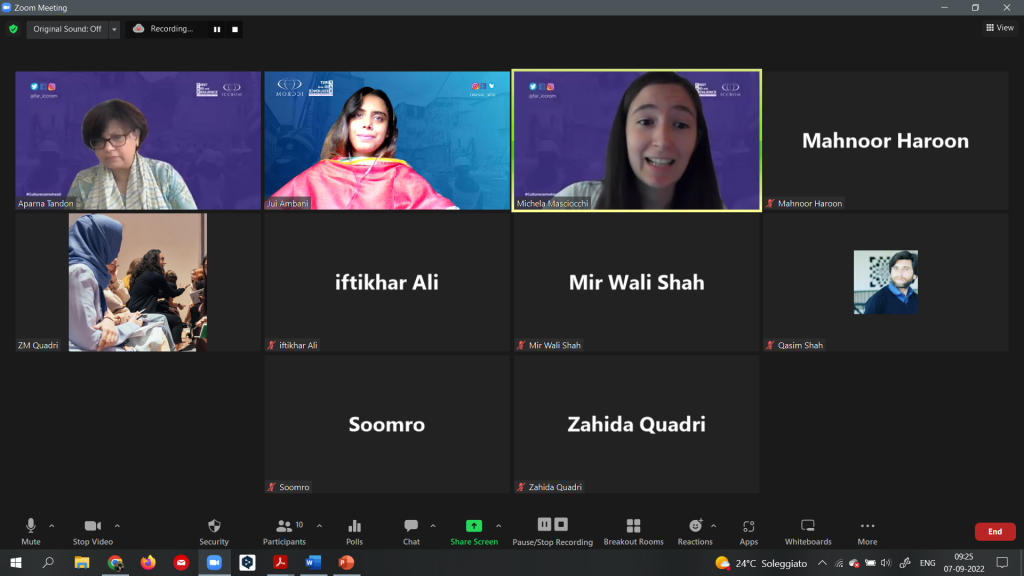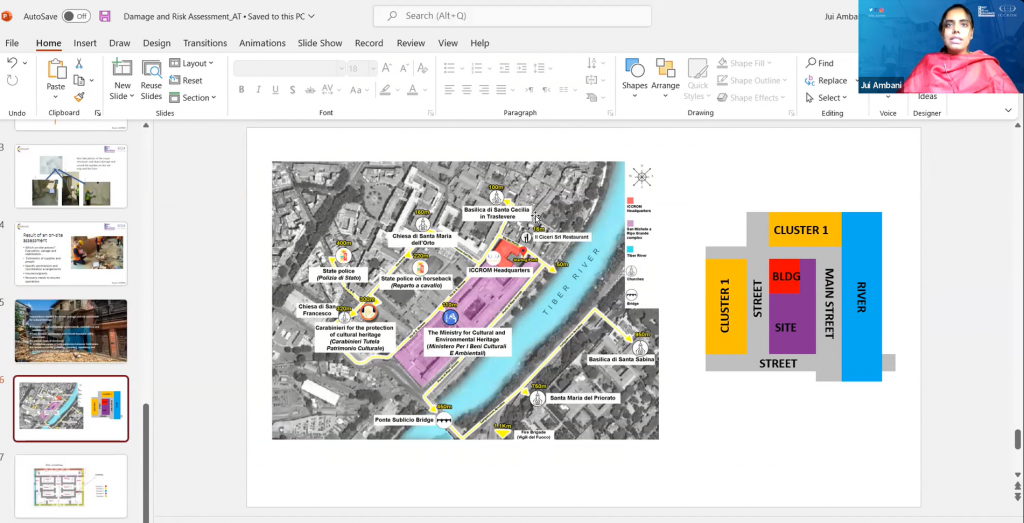 Workshop on conducting damage and risk assessment in progress. September 7, 2022
Workshop on conducting damage and risk assessment in progress. September 7, 2022Since June 2022, widespread flooding and unprecedented torrential rains have left one-third of Pakistan underwater, leading to a humanitarian crisis impacting more than 33 million people, as well as inflicting severe damage to cultural heritage across the country.
According to the Global Climate Risk Index, Pakistan is among the ten countries, most affected by extreme weather events, even though it its carbon emissions make up less than 1% of the global total. The impact of this year’s torrential rains is also compounded by Pakistan’s continued glacial-outburst floods which are rapidly filling or overflowing nearby water bodies, leading to flash floods and rain-induced landslides.
This devastating disaster yet again underscores the need for emergency preparedness and an efficient emergency response to build resilience in times of crises.
%20of%20walls%20post-rains%20at%20Mohenjo%20Daro%20World%20Heritage%20Site.png) Protecting the outer covering (mud slurry) of walls post-rains at Mohenjo Daro World Heritage Site. Photo credit: Zahida Quadri
Protecting the outer covering (mud slurry) of walls post-rains at Mohenjo Daro World Heritage Site. Photo credit: Zahida QuadriUpon a formal request from a trained cultural first aider, Mr Mir Wali Shah, an architect and PhD student from Hazara University in Pakistan, FAR organized a multi-disciplinary training workshop on conducting post-event, on-site damage and risk assessments for safeguarding cultural heritage.
This workshop closely involved Zahida Quadri from the Antiquities wing of Culture Tourism & Antiquities Department, Govt of Sindh, and Javed Husein from the Sindh Community Foundation (SCF), Pakistan, who are currently implementing emergency response and disaster risk management for two World Heritage sites in Pakistan - Makli and Mohenjo Daro - as part of the project implementation phase of the ICCROM-ALIPH Alliance for Cultural Heritage, Peace and Resilience Project. Representatives from the Provincial Disaster Management Authorities and the Aga Khan Agency of Habitat also joined the workshop, strengthening interagency coordination and effort towards safeguarding cultural heritage in Pakistan.
FAR tailored damage and risk assessment forms for movable, immovable, archaeological and intangible heritage on its web and mobile app and deployed them on-the-ground for field testing and emergency documentation in the Makali and Mohenjo Daro World Heritage Site, Kalam Masjid - a 150-year-old mosque in Northern Pakistan.
 Aparna Tandon, Senior Programme Leader, and Jui Ambani, Disaster Risk Management Consultant from the FAR Programme, ICCROM, led participants through a step-by-step workflow on how to collect useful data using ICCROM’s new damage assessment app. The app automates large-scale data collection for damage and risk assessments for all types of heritage, helps estimate costs and supplies, ensures an efficient use of resources and defines clear priorities to promote early recovery.
Aparna Tandon, Senior Programme Leader, and Jui Ambani, Disaster Risk Management Consultant from the FAR Programme, ICCROM, led participants through a step-by-step workflow on how to collect useful data using ICCROM’s new damage assessment app. The app automates large-scale data collection for damage and risk assessments for all types of heritage, helps estimate costs and supplies, ensures an efficient use of resources and defines clear priorities to promote early recovery.
What kind of assistance does FAR offer in an emergency?
Rapidly implemented post-event damage and risk assessments, whether conducted remotely or on-site, are integral to an efficient emergency response. ICCROM’s FAR Programme specializes in this methodology and is experienced in helping governments define priorities in the aftermath of large-scale emergencies and disasters.
Upon specific request of the affected Member State or ICCROM partner institution, as well as for incidents involving substantive damage to cultural heritage far exceeding the capacity of the affected Member State, FAR provides:
- Context-specific rapid needs assessments and post-event damage and risk assessments for safeguarding cultural heritage;
- On-site or online training for emergency responders, civil defense personnel, heritage professionals, experts and volunteers to provide first aid to tangible and intangible heritage;
- Capacity building for planning and implementing post-disaster and post-conflict recovery and peacebuilding operations;
- Setting up interagency coordination mechanisms; and
- Sharing and translating relevant resources.
FAR is seeking partners to use the damage and risk assessment application in different emergency contexts.
